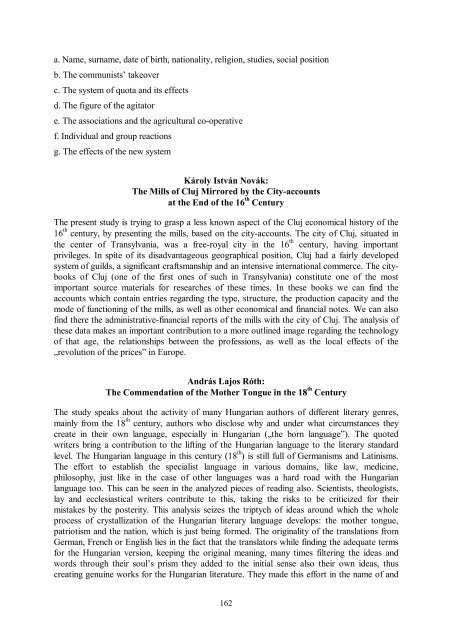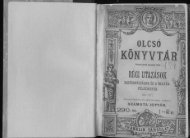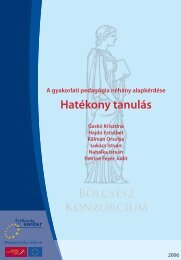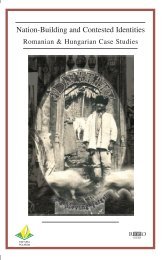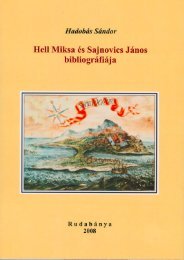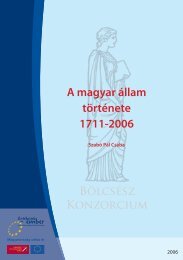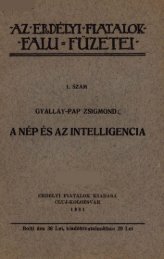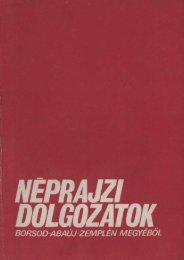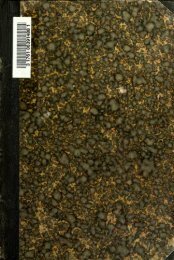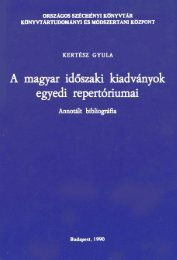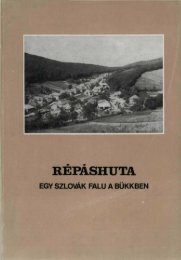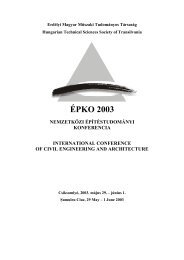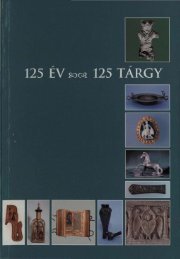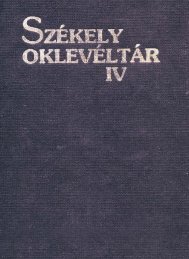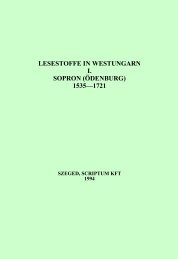AREOPOLISZ - MEK - Országos Széchényi Könyvtár
AREOPOLISZ - MEK - Országos Széchényi Könyvtár
AREOPOLISZ - MEK - Országos Széchényi Könyvtár
You also want an ePaper? Increase the reach of your titles
YUMPU automatically turns print PDFs into web optimized ePapers that Google loves.
a. Name, surname, date of birth, nationality, religion, studies, social position<br />
b. The communists’ takeover<br />
c. The system of quota and its effects<br />
d. The figure of the agitator<br />
e. The associations and the agricultural co-operative<br />
f. Individual and group reactions<br />
g. The effects of the new system<br />
Károly István Novák:<br />
The Mills of Cluj Mirrored by the City-accounts<br />
at the End of the 16 th Century<br />
The present study is trying to grasp a less known aspect of the Cluj economical history of the<br />
16 th century, by presenting the mills, based on the city-accounts. The city of Cluj, situated in<br />
the center of Transylvania, was a free-royal city in the 16 th<br />
century, having important<br />
privileges. In spite of its disadvantageous geographical position, Cluj had a fairly developed<br />
system of guilds, a significant craftsmanship and an intensive international commerce. The citybooks<br />
of Cluj (one of the first ones of such in Transylvania) constitute one of the most<br />
important source materials for researches of these times. In these books we can find the<br />
accounts which contain entries regarding the type, structure, the production capacity and the<br />
mode of functioning of the mills, as well as other economical and financial notes. We can also<br />
find there the administrative-financial reports of the mills with the city of Cluj. The analysis of<br />
these data makes an important contribution to a more outlined image regarding the technology<br />
of that age, the relationships between the professions, as well as the local effects of the<br />
„revolution of the prices” in Europe.<br />
András Lajos Róth:<br />
The Commendation of the Mother Tongue in the 18 th Century<br />
The study speaks about the activity of many Hungarian authors of different literary genres,<br />
mainly from the 18 th century, authors who disclose why and under what circumstances they<br />
create in their own language, especially in Hungarian („the born language”). The quoted<br />
writers bring a contribution to the lifting of the Hungarian language to the literary standard<br />
level. The Hungarian language in this century (18 th ) is still full of Germanisms and Latinisms.<br />
The effort to establish the specialist language in various domains, like law, medicine,<br />
philosophy, just like in the case of other languages was a hard road with the Hungarian<br />
language too. This can be seen in the analyzed pieces of reading also. Scientists, theologists,<br />
lay and ecclesiastical writers contribute to this, taking the risks to be criticized for their<br />
mistakes by the posterity. This analysis seizes the triptych of ideas around which the whole<br />
process of crystallization of the Hungarian literary language develops: the mother tongue,<br />
patriotism and the nation, which is just being formed. The originality of the translations from<br />
German, French or English lies in the fact that the translators while finding the adequate terms<br />
for the Hungarian version, keeping the original meaning, many times filtering the ideas and<br />
words through their soul’s prism they added to the initial sense also their own ideas, thus<br />
creating genuine works for the Hungarian literature. They made this effort in the name of and<br />
162


